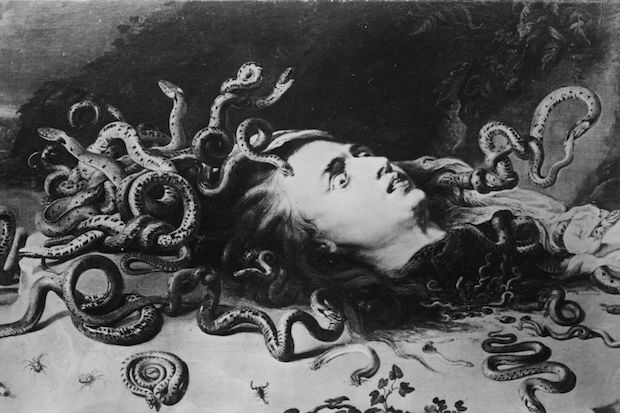With ‘both arms stretched out like a starfish, her long hair floating like seaweed at the sides of her body’, Kitty Finch swam naked into view in Deborah Levy’s Booker-shortlisted Swimming Home. Similarly, in Hot Milk, Sofia Papastergiadis loves to swim —as, indeed, does Levy herself. Only, whereas Kitty swims up and down the gravelike plot of a villa’s swimming pool, Sofia prefers the open expanse of the sea.
She swims off the coast of Spain, in Almeria, where she is helping her mother find treatment for the periodic ‘mysterious’ paralysis of her legs. Caring for her mother means that she has given up pursuing a doctorate in anthropology, despite her first-class degree. She reflects that her ‘mother tongue’ is ‘the language of symptoms and side effects’ and recalls, soon after her father left, climbing into bed with her mother — who felt as though she was ‘folding her growing child back into her womb in the way an aeroplane folds its wheels back into its body after take-off’. Their bodies remain unnaturally linked, as Sofia shakes the doctor’s hand on her mother’s behalf — ‘her arm is my arm’ — and finds herself adopting her limp — ‘my legs are her legs’. She swims alone, however. Levy catches Sofia at the moment of severing her filial bond: ‘My love for my mother is like an axe. It cuts deep.’
If there are whispers of Electra in Sofia, the Greek daughter with her axe-like love for her mother (a chapter is even titled ‘Matricide’), then another myth which Levy invites us to read into her story is that of Medusa. Sofia swims in a sea awash with stinging jellyfish, or ‘medusas’, as they are called in Spain. Levy reminds us that Medusa ‘was a Greek goddess who became a monster after being cursed, and that her powerful gaze turned anyone who looked into her eyes to stone’. So Levy gives us her own Medusa in Sofia, ‘the beautiful Greek girl’ with the snake-like curls of her hair and her piercing anthropologist’s gaze.
Here, then, is a reason for her mother’s strange paralysis: ‘If I were to look at my mother just once in a certain way, I would turn her to stone.’ Levy also offers a Perseus in Sofia’s newfound lover Ingrid — a powerful woman who decapitates a snake, then rides a horse, echoing the myth of Perseus beheading the snake-headed Medusa and the following birth of Pegasus.
Ingrid is not only Perseus, however, she is also Athena — goddess of war and craft — in that she is a seamstress, sewing for a local vintage shop all summer. As Sofia’s lover, beautiful with her golden hair in a ‘silky plait’, perhaps Ingrid is Aphrodite too. Levy playfully summons all three figures when Ingrid embroiders a word on to a silk top for Sofia. At first, Sofia reads the sewing as ‘beloved’, but later she sees it in fact spells ‘beheaded’.
‘What is a myth?’ Ingrid asks. ‘That is a big question. It would be true to say that I was probably obsessed with it,’ answers Sofia. In this powerful novel about a daughter’s struggle to define herself, Levy draws attention to the mythic in all of us. She shows us that myths are not so much the stories we inherit as they are what we decide to make from them. So we can pick and choose our goddesses and gorgons, elect to be Electra or Medusa, borrow an action from Athena and a word from Aphrodite. It is captured in the book’s epigraph from Hélène Cixous’s feminist text The Laugh of the Medusa: ‘It’s up to you to break the old circuits.’ In Hot Milk Levy shows us the exquisite difficulty of realising that, in a world of myths, we have the freedom to write our own parts.






Comments